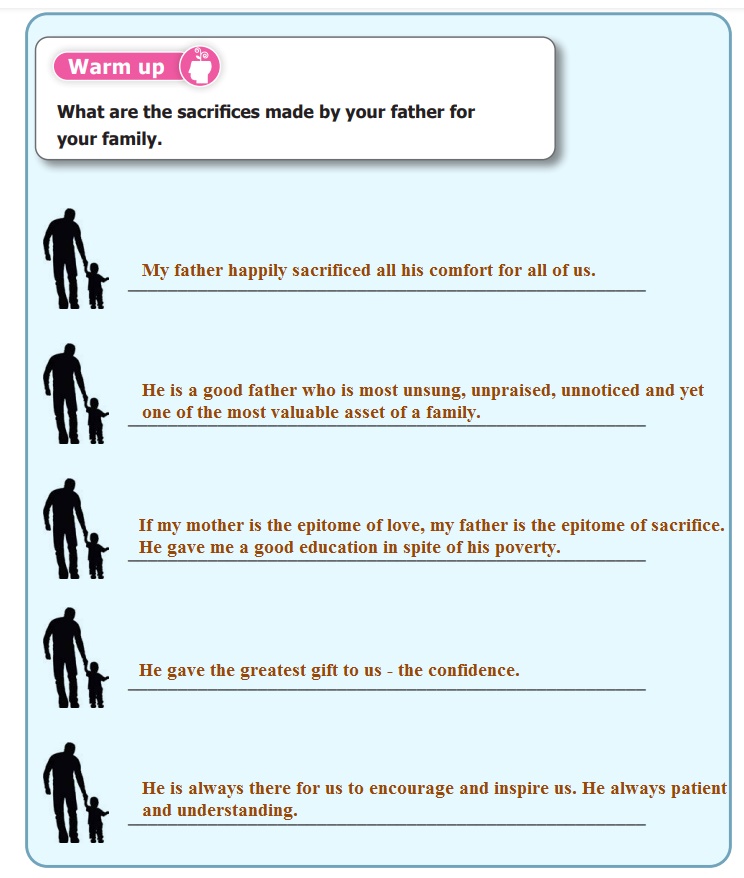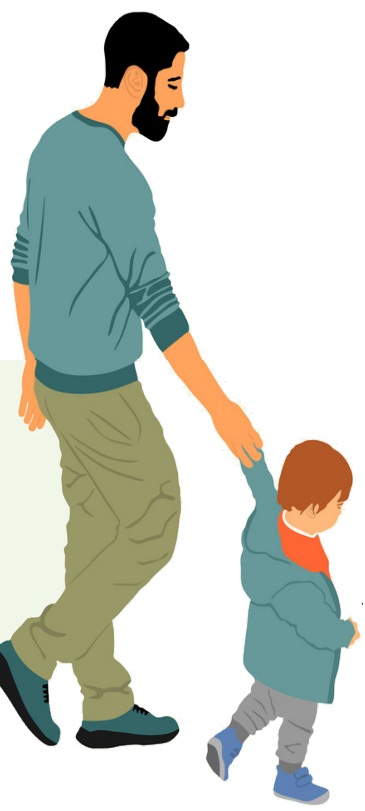English : Unit 1 : Poem : Special Hero
Warm up
What are the sacrifices made by your father for your family.

Answer:
My father happily sacrificed all his comfort for all of us.
He is a good father who is most unsung, unpraised, unnoticed and yet one of the most valuable asset of a family.
If my mother is the epitome of love, my father is the epitome of sacrifice. He gave me a good education in spite of his poverty.
He gave the greatest gift to us – the confidence.
He is always there for us to encourage and inspire us. He always patient and understanding. .
Glossary
tenderness (n) – gentleness and kindness
everlasting (adj) – lasting forever or a very long time
special(adj) – different from what is usual
Figures of Speech – A Glance
Figures of Speech – A Glance
A ‘Figure of Speech’ is a word or a phrase which gives a separate meaning from the normal one. It means something more than it seems to mean. It is used figuratively, to give an implied meaning to the given context. It can either be used to make comparisons, or even to insist repetition or exaggeration. Figures of speech provide a dramatic effect.
1. Alliteration
Alliteration is the repetition of the same consonant letters or similar sounds at the beginning words in a set or series of words,
e.g.
wild wind
curious clock
splendid scholar
memorable moments
creepy crawlies
e-g-
“There is something special
about a fathers love”.
In the above lines, the alliterated words are : something, special.
2. Simile:
A ‘Simile’ is a figure of speech, in which two unlike things are compared, using the words, ‘like’ or ‘as’.
It is used to bring a dramatic effect in Prose. Simile is one of the most common forms of a figure of speech and is also used in poems as well as our day-to-day talks.
E.g.
as blind as a bat (means that someone is not willing to notice)
like peas in a pod (means that two people are quite similar)
as wise as an owl (refers to someone who is very smart / knowledgeable)
quiet like a mule (refers to someone who is silent / quiet)
as brave as a lion (refers to someone who is too brave/courageous)
3. Metaphor:
A ‘Metaphor’ is quite similar to a ‘Simile’, as a ‘Metaphor’ also compares two unlike things. But a Metaphor has an implied or a hidden meaning between unrelated things.
Here, for a Metaphor, we do not use words such as ‘like’ or ‘as’. Unlike Similes which compare two things, Metaphors directly state a comparison to things that are in no way similar. We can use Metaphors to explain an idea, but its literal meaning should not be taken. It is only to be used as a symbolism.
e.g.
My father was boiling mad. (implies that he was too angry)
She is the apple of my eye. (implies that she is too dear to me)
Your brain is a computer. (implies that your brain is smart and quick)
Her voice is music to his ears. (implies that her voice makes him feel happy)
The given task was a breeze. (implies that the task was not difficult)
4. Personification
Personification is a figure of speech in which a thing, an idea or an animal is given a human attribute. Human qualities are given to non-human things or ideas, for a better understanding the writer’s message.
The use of personification also helps to show a character’s attitude towards inanimate objects. This adds interest and fun to poems and stories. The literal meaning of the words should not be taken into consideration.
e.g.
The Sun smiled down upon them.
Justice is blind.
The wind howled in the night.
The moon played hide and seek with the clouds.
The city never sleeps at night.
‘The boat danced in the puddle.
The flowers nodded their heads
The thunder grumbled.
The lightning danced all over the sky.
The iron hands of Death.
The popcorn left out of the bowl.
5. Imagery
Imagery is the way that a writer helps reader visualize or see in their minds what is being described. These images often suggest emotions. Images appeal to one or more of the five senses: sight, hearing, touch, taste or smell.
e-g.
It was dark and cloudy in the woods.
‘The boys were screaming and shouting in the playground.
The mountain was spewing and spitting the smoke.
‘The sauce was sweet and sour.
6. Repetition:
Repetition is a literary device that repeats the same words of phrases a few times to make an idea clearer and more memorable. It is used to emphasize a feeling or idea, create rhythm, and bring attention to an idea.
e.g.
The woods are lovely, dark, and deep,
But I have promises to keep
And miles to go before I sleep,
and miles to go before I sleep.
7. Hyperbole
Hyperbole is a figure of speech that involves an exaggeration of ideas for the sake of emphasis. Here, the things are made appear greater than they usually are. It is a device that we employ in our day-to-day speech.
e.g.
I have told you thousand times not to play games in the mobile!
Madurai is the town that never sleeps.
He walks as slow as a turtle.
8. Rhyming words
‘Rhyming words’ are two or more words which have the same sound. Words ‘rhyme’ if they have similar sounds when said aloud. ‘Rhyming words’ usually occur at the end of the lines in a poem. Rhyming words make poems or songs fun to sing.
e-g.
Out came the bright Sunshine,
Down crept its light,
Into the seed, too bright.
In the above lines, the rhyming words are : light, bright.
9. Rhyme Scheme
A ‘Rhyme Scheme’ is a specific pattern used in a poem which determines which lines rhyme in the poem. Poets write poems with a rhyme scheme or a pattern. It is the arrangement of rhymes in a poem or a stanza.
e.g.
Upon a nice mid-spring day, a
Let’s take a look at Nature’s way, a
Breathe the scent of nice, fresh hair, b
Feel the breeze within your hair. b
The grass will poke between your toes. c
Smell the flowers with your nose. c
Clouds form shapes within the skies. d
And light will glisten from your eyes. d
The rhyme scheme of this poem can be determined by the end word in each line.
The first line ends with the word ‘day’ and the second line ends with ‘way’. As both words rhyme with other, they are given the letter ‘a’.
The third line ends with the word ‘air’ and the fourth line ends with ‘hair’. These two words do not rhyme with the ending words of the first two lines. So, they are given the letter ‘b’ and so on.
We get a rhyme scheme aabb ccdd for this poem.
Questions Answers
A. Read the poem aloud in pairs.
B. Find a line from the poem to match the statements given below and write it in the blank.
1. He always saves me from harm [Answer: keeping me safe from harm”.]
2. I am so lucky to get you [Answer: “How did I get so lucky. You were the Dad chosen for me”. ]
3. The affection between us has no end [Answer: “Our love is everlasting”. ]
C. Answer the following questions.
1. Who is the speaker?
Answer: The poet, Christina M. Kerschen, is the speaker.
2. Who is the special hero mentioned in the poem?
Answer: The poet’s father is the special hero mentioned in the poem.
3. How did the child feel when it was hold by its dad?
Answer: The child felt the love and kindness of her father. She felt that she was safe from harm.
Seems it was sent to me
From someplace up above.
4. What do the above lines mean?
Answer: The above lines means that the poet’s father is sent to her from heaven.
5. What did the child want to tell its dad?
Answer: The child wanted to tell her dad that he was her special hero.
D. Work in pairs and answer the questions below.
1. “There is something special
about a father’s love”.
Identify the alliteration in the given lines.
Answer: “something – special”, are the alliterated words in the given lines.
2. Pick out the rhyming words from the poem.
Answer: see – me; love – above; know – so are the rhyming words.
Poem Comprehension
1. I felt the love and tenderness
keeping me safe from harm
(a) Who felt the love and tenderness?
Answer: The poet felt the love and tenderness of her father.
(b) What did he keep her safe?
Answer: He kept her safe from harm.
(c) What do you mean by ‘tenderness’?
Answer: ‘Tenderness’ means “Gentleness and kindness”.
2. How did I get so lucky.
You were the dad chosen for me
a. who was lucky?
Answer: The poet was lucky.
b. why was she lucky?
Answer: She was lucky because he was the dad chosen for her.
c. Is the poet excited about her father’s love?
Answer: Yes, she is excited and feels lucky to get a Dad like him.
Poetic Devices.
1. Seems it was sent to me
from someplace up above
Pick out the alliterated words?
Answer: “Seems – sent” are alliterated words.
2. I just wanted you to know
That you’re my special hero
and 1 wanted to tell you so.
Pick out the rhyming words.
Answer: “know – so” are the rhyming words.
Short Questions and Answers.
1. When did the poet’s father hold her in his arms?
Answer: He held her in his arms when she was a baby.
2. What did she see, when she looked up into his eyes?
Answer: She saw all the love of her father, when she looked up into his eyes.
3. What is something special?
Answer: There is something special about a father’s love.
4. Whose love is everlasting?
Answer: The love between the father and the child is everlasting.
5. Who is the poet of this poem?
Answer: Christina M. Kerschen is the poet of this poem.
Writing
E) Write a paragraph on the father’s love as described in the poem.
Answer: The poet describes her father’s love in this poem. When she was a baby, he held her in his arms. She felt his love and kindness. He always kept her safe from harm. She saw his love for her in his eyes. She said that she was lucky that he was the dad chosen for her. There was something special about her father’s love. He was sent to her from heaven. She wanted him to know that their love lasts forever. She also wanted totell him that he was her special hero.
Parallel Reading
ONLY A DAD
Only a dad, with a tired face,
Coming home from the daily race,
Bringing little of gold or fame,
To show how well he has played the game,
But glad in his heart that his own rejoice
To see him come, and to hear his voice.
Only a dad, with a brood of four,
One of ten million men or more.
Plodding along in the daily strife,
Bearing the whips and the scorns of life,
With never a whimper of pain or hate,
For the sake of those who at home await.
Only a dad, neither rich nor proud,
Merely one of the surging crowd
Toiling, striving from day to day,
Facing whatever may come his way,
Silent, whenever the harsh condemn,
And bearing it all for the love of them.
Only a dad, but he gives his all
To smooth the way for his children small,
Doing, with courage stern and grim,
The deeds that his father did for him.
This is the line that for him I pen,
Only a dad, but the best of men.
Edgar Albert Guest

1. What does Dad bring?
Answer: He brings little of gold or fame.
2. Who bears the whips and scorns of life?
Answer: Dad bears the whips and scorns of life
3. What is Dad to the kids?
Answer: He is everything to the kids. He is the best of men.
4. How does dad come home?
Answer: He comes home with a tired face after working hard.
5. Who is the poet of this poem?
Answer: ‘Edgar Albert Guest’ is the poet of this poem.














